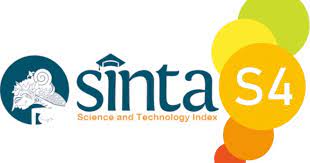Ramification of social-emotional learning on students’ academic success in English: A systematic literature review
DOI:
https://doi.org/10.22219/englie.v5i2.34534Keywords:
academic success, EFL/ESL, English learning, social-emotional competence, social-emotional learning, pedagogical competenceAbstract
This study aims to explore the previous research using systematic literature review related to the ramification between social-emotional learning competence (henceforth, SEL competence) and students’ academic achievement in English learning context related to the integration of SEL in English learning. The study also investigates whether SEL competence levels of EFL/ESL students and teachers are correlate with students’ academic success based on the literature review on the previous study related to the relationship between SEL and English achievement. This study belongs to systematic literature review using PRISMA model for data collection and thematic analysis to analyze the data. The result of systematic literature review showed that SEL competence has a positive correlation with EFL/ESL students’ academic achievement which means the higher SEL competence levels that students have, the higher score in English subject they have. The result also indicated both English teachers’ and students’ SEL competence levels are important for teaching and learning process which connected to the motivation that can increase students’ engagement to learn English. Result showed that the relationship between SEL competence levels and students’ academic achievement in EFL/ESL context linked to the integration of SEL in the classroom, SEL play an important role as the way for students to learn how to control themselves, their relationships, emotions, and SEL does not replace anything in classroom.
Downloads
References
Alejandra, C., & Luna, V. (2020). Integrating social and emotional learning in the foreign language classroom. Area of Teacher’s Education, 1(1), 1–147. http://dx.doi.org/10.6007/IJARBSS/v12-i6/13950
Alrefaai, I., & Shah, S. A. (2020). The role of emotional intelligence in the EFL classroom: Reflections of EFL teachers. Journal of Education in Black Sea Region, 6(1), 110–118. https://doi.org/10.31578/jebs.v6i1.223
Alzahrani, M., Alharbi, M., & Alodwani, A. (2019). The effect of social-emotional competence on children academic achievement and behavioral development. International Education Studies, 12(12), 141. https://doi.org/10.5539/ies.v12n12p141
Anisa, L., Suganda, L. A., & Jaya, H. P. (2019). Indonesian english teachers’ social-emotional competence and students’ english learning motivation. IJELTAL (Indonesian Journal of English Language Teaching and Applied Linguistics), 4(1), 83–94. https://doi.org/10.21093/ijeltal.v4i1.320
Ayar, Z. (2023). An investigation of turkish EFL teachers’ perceptions of social-emotional learning and school climate. Dil Eğitimi ve Araştırmaları Dergisi, 9(2), 298–316. https://doi.org/10.31464/jlere.1298621
Bai, B., Shen, B., & Wang, J. (2021). Impacts of social and emotional learning (SEL) on english learning achievements in hong kong secondary schools. Language Teaching Research, 1 (1), 1–25. https://doi.org/10.1177/13621688211021736
CASEL. (2020). What Are the Core Competence Areas and Where Are They Promoted?. Available at: https://casel.org/casel-sel-framework-11-2020/
CASEL. (2013). CASEL guide: Effective social and emotional learning programs preschool and elementary school edition. Chicago, IL: CASEL. Available at: https://files.eric.ed.gov/fulltext/ED581699.pdf
Clarke, V., Braun, V. (2014). Thematic analysis in: Teo, T. (eds) Encyclopedia of Critical Psychology. Springer, New York, NY. https://doi.org/10.1007/978-1-4614-5583-7_311
Collie, R. J. (2020). The development of social and emotional competence at school: An integrated model. International Journal of Behavioral Development, 44(1), 76–87. https://doi.org/10.1177/0165025419851864
Elias, M. J., Zins, J. E., Weissberg, T. P., Frey, K. S., Greenberg, M. T., Haynes, N. M., & Shriver, T. P. (1997). Promoting social and emotional learning: Guidelines for educators. Alexandria, VA: Association for Supervision and Curriculum Development. https://earlylearningfocus.org/wp-content/uploads/2019/12/promoting-social-and-emotional-learning-1.pdf.
Gimbert, B. G., Miller, D., Herman, E., Breedlove, M., & Molina, C. E. (2023). Social emotional learning in schools: The importance of educator competence. In Journal of Research on Leadership Education 18 (1). https://doi.org/10.1177/19427751211014920
Hadiyanto, H., Failasofah, F., Armiwati, A., Abrar, M., & Thabran, Y. (2021). Students’ practices of 21st century skills between conventional learning and blended learning. Journal of University Teaching and Learning Practice, 18 (3), 1–29. https://doi.org/10.53761/1.18.3.7
Hermana, P., Zuraida, Z., & Suganda, L. A. (2021). Indonesian pre-service teachers’ mindfulness, social emotional competence, and academic achievement. International Journal of Evaluation and Research in Education (IJERE), 10(4), 1176. https://doi.org/10.11591/ijere.v10i4.21272
Kane, R. (2017). Beginning teacher induction. February, 1–4. Retrieved from https://doi.org/10.1093/OBO/9780199756810
Katzman, N. F., & Stanton, M. P. (2020). The integration of social emotional learning and cultural education into online distance learning curricula: Now imperative during the covid-19 pandemic. Creative Education, 11 (09), 1561–1571. https://doi.org/10.4236/ce.2020.119114
Kraus, S., Breier, M., Lim, W. M., Dabić, M., Kumar, S., Kanbach, D., Mukherjee, D., Corvello, V., Piñeiro-Chousa, J., Liguori, E., Palacios-Marqués, D., Schiavone, F., Ferraris, A., Fernandes, C., & Ferreira, J. J. (2022). Literature reviews as independent studies: Guidelines for academic practice. Review of Managerial Science, 16 (8), 2577–2595. https://doi.org/10.1007/s11846-022-00588-8
Mihai, M., Albert, C. N., Mihai, V. C., & Dumitras, D. E. (2022). Emotional and social engagement in the English language classroom for higher education students in the Covid-19 online context. Sustainability (Switzerland), 14 (8). https://doi.org/10.3390/su14084527
Nall, M. (2020). Supporting social and emotional learning in the EFL/ESL classroom: How the new science of child development can inform second language acquisition theory and practice. Journal of English Learner Education. (10) 1. Retrieved from https://stars.library.ucf.edu/jele/vol10/iss1/5
Net, W. W. W. P., Luh, N., Ning, P., Putri, S., Santosa, M. H., & Putu, L. (2024). Sustainable development goals in EFL students’ learning: A systematic review. Pegem Journal of Education and Instruction, 14 (2), 1–11. https://doi.org/10.47750/pegegog.14.02.01
Ratminingsih, N. M. (2017). Metode dan strategi pembelajaran bahasa Inggris. PT Raja Grafindo Persada.
Saggers, B., & Strachan, J. (2016). Horsing around: Using equine facilitated learning to support the development of social-emotional competence of students at risk of school failure. Child and Youth Services, 37 (3), 231–252. https://doi.org/10.1080/0145935X.2015.1072045
Santosa, M. H., Harismayanti, I., & Jaya Putra, I. N. A. (2022). Technology in action: Developing gamification handbook in english teaching and learning for the 21st century learners. Tesl-Ej, 26 (1), 1–25. https://doi.org/10.55593/EJ.26101A2
Santosa, M. H., Ratminingsih, N. M., & Adnyani, L. D. S. (2021). Students’ learning approaches in the EFL emergency online learning context. JEELS (Journal of English Education and Linsguistics Studies, 8 (2), 185–220. https://doi.org/10.1080/07352689
Santosa, M. H., Wulandari, N. L. P. N., & Mahendrayana, G. (2023). Exploring students’ and lecturers’ anxiety in learning english during emergency remote teaching in a public university in north bali. LLT Journal: Journal on Language and Language Teaching, 26 (2), 429–439. https://doi.org/10.24071/llt.v26i2.3760
Schonert-Reichl, K. A. (2022). Social and emotional learning. International Encyclopedia of Education: Fourth Edition, 92–106. https://doi.org/10.1016/B978-0-12-818630-5.14010-2
Schoon, I. (2021). Towards an integrative taxonomy of social-emotional competences. Frontiers in Psychology, 12, 1–9. https://doi.org/10.3389/fpsyg.2021.515313
Suganda, L. A., Petrus, I., & Zuraida, Z. (2021). EFL teacher’s code switching in the social emotional learning context. Indonesian Research Journal in Education |IRJE|, 5 (2), 317–344. https://doi.org/10.22437/irje.v5i2.12195
Sujana, S. A., Jaya, H. P., & Fiftinova, F. (2021). Social adjustment and academic achievement of EFL students at higher education. The Journal of English Literacy Education: The Teaching and Learning of English as a Foreign Language, 8 (2), 138–149. https://doi.org/10.36706/jele.v8i2.14328
Sulaiman, J., & Ismail, S. N. (2020). Teacher competence and 21st century skills in transformation schools 2025 (TS25). Universal Journal of Educational Research, 8 (8), 3536–3544. https://doi.org/10.13189/ujer.2020.080829
Surahman, E., & Wang, T. H. (2022). Academic dishonesty and trustworthy assessment in online learning: A systematic literature review. Journal of Computer Assisted Learning, 38(6), 1535-1553. https://doi.org/10.1111/jcal.12708
Teba, S. C. (2023). Exploring the use of social and emotional learning ( SEL ) to enhance oral communication in beninese ESP teaching-learning process case study of lycée technique et professionnel of porto-novo (Benin Republic). International Journal of Innovative Science and Research Technology. 8 (9), 941–948. https://doi.org/10.5281/zenodo.8379537
Utami, N. L. G. F. P., & Santosa, M. H. (2023). Using voice thread to develop the speaking skills of EFL learners: A systematic literature review. Jurnal Inovasi Dan Teknologi Pembelajaran, 10(1), 83–90. https://doi.org/10.17977/um031v10i12023p083
Wang, S., Chen, Y., & Wan, Y. (2022). English as a foreign language learners’ academic achievement: Does creativity and self-efficacy matter? Frontiers in Psychology, 13, 1–4. https://doi.org/10.3389/fpsyg.2022.877679
Wirajaya, G., Suganda, L. A., & Zuraida, Z. (2019). Indonesian students’ social-emotional competencies and their English academic achievement. Journal of Education and Learning (EduLearn), 13 (2), 163–169. https://doi.org/10.11591/edulearn.v13i2.12160
Wiraningsih, P., & Santosa, M. H. (2020). EFL teachers’ challenges in promoting learner autonomy in the 21st-century learning. Journal on English as a Foreign Language, 10 (2), 290–314. https://doi.org/10.23971/jefl.v10i2.1881
Yang, Q. (2022). An analysis on EFL learners’ emotional intelligence, academic emotions and EFL learning achievement. IRA International Journal of Education and Multidisciplinary Studies, 18 (4), 59. https://doi.org/10.21013/jems.v18.n4.p8
Yen, T. T., Thi, N., Huong, M., & Tuan, H. A. (2024). Exploring the social and emotional aspects of teaching and learning English as a foreign language. VNU journal of foreign studies. 40 (1). 166-187. https://doi.org/10.63023/2525-2445/jfs.ulis.5185
Yılmaz, A. (2021). The effect of technology integration in education on prospective teachers’ critical and creative thinking, multi dimensional 21st century skills and academic achievements. Participatory Educational Research, 8 (2), 163–199. https://doi.org/10.17275/per.21.35.8.2
Zhang, C., Mao, L., Li, N., & Gu, X. (2022). Chinese EFL students’ social-emotional competence, grit, and academic engagement. Frontiers in Psychology, 13(1), 1–9. https://doi.org/10.3389/fpsyg.2022.914759
Бевз, О. (2023). Developing EFL trainee teachers’ readiness for providing social and emotional support to secondary school learners. Modern Engineering and Innovative Technologies, 29–03, 46–50. https://doi.org/10.30890/2567-5273.2023-29-03-019
Downloads
Published
How to Cite
Issue
Section
License
Copyright (c) 2024 Antasari et al.

This work is licensed under a Creative Commons Attribution-ShareAlike 4.0 International License.
Authors who publish with English Learning Innovation (englie) agree to the following terms:
- For all articles published in English Learning Innovation (englie), copyright is retained by the authors. Authors give permission to the publisher to announce the work with conditions. When the manuscript is accepted for publication, the authors agree to automatic transfer of the publishing right to the publisher.
- Authors retain copyright and grant the journal right of first publication with the work simultaneously licensed under a Creative Commons Attribution-ShareAlike 4.0 International License that allows others to share the work with an acknowledgement of the work's authorship and initial publication in this journal.
- Authors are able to enter into separate, additional contractual arrangements for the non-exclusive distribution of the journal's published version of the work (e.g., post it to an institutional repository or publish it in a book), with an acknowledgment of its initial publication in this journal.
- Authors are permitted and encouraged to post their work online (e.g., in institutional repositories or on their website) prior to and during the submission process, as it can lead to productive exchanges, as well as earlier and greater citation of published work (See The Effect of Open Access).
This work is licensed under a Creative Commons Attribution-ShareAlike 4.0 International License.
















1.png)












